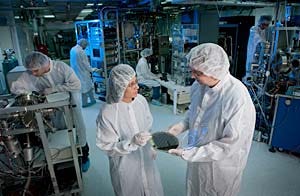October 3, 2012
|
The ASSIST team at NC State is developing self-powered medical devices. |
North Carolina State University (NC State; Raleigh) is heading a nanotechnology research effort, the goal of which is to develop self-powered medical devices. Researchers at the National Science Foundation's Nanosystems Engineering Research Center for Advanced Self-Powered Systems of Integrated Sensors and Technologies (ASSIST) will use minuscule materials to produce self-powered health monitoring sensors and devices capable of monitoring a range of biological systems. The devices will eventually be available in a variety of forms, including patches worn on the skin, bracelets, or caps to fit over a tooth.
The new devices will generate power based on nanomaterials, nanostructures, thermoelectric materials that use body heat, and piezoelectric materials that use body motion. Thus, changing and recharging batteries will become a thing of the past. In addition, the ASSIST researchers' hope is that the devices will consume small amounts of energy.
"Currently there are many devices out there that monitor health in different ways," remarks Veena Misra, the center's director and professor of electrical and computer engineering at NC State. "What's unique about our technologies is the fact that they are powered by the human body, so they don't require battery charging."
At the center's headquarters at NC State's Centennial campus, ASSIST researchers will develop thermoelectric materials for harvesting body heat and nanosensors for gathering health information from the body such as heart rate, oxygen levels, and respiration data. In addition, the researchers will develop technologies for packaging the technology into wearable medical devices.
The center is also partnering with other universities in an effort to develop their technology. Thus, at Penn State, researchers will create new piezoelectric materials and energy-efficient transistors. The University of Virginia team will research methods for enabling the devices to run on small amounts of power, while the Florida International University group will create sensors for gathering biochemical signals from the body, such as stress levels.
The results of their work, coupled with low-power radios developed by the University of Michigan, will be used to process and transmit health data gathered by the sensors to computers and consumer devices. The University of North Carolina at Chapel Hill will provide ASSIST with medical guidance and arrange testing of the center's technology.
ASSIST will also draw on the expertise of the medical device industry to help market the new devices. These partners include companies and agencies involved with nanomaterials and nanodevices, integrated chip manufacturing, software development, bioengineering, and healthcare.
About the Author(s)
You May Also Like



